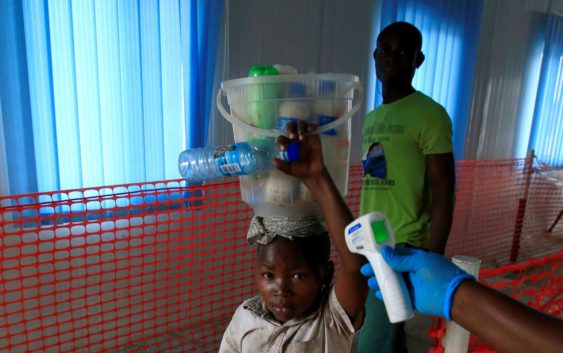- Governor Sanwo-Olu flags off Ojota-Opebi Link Bridge, to be completed in 20 months
- Allow Nigeria go to 2022 World Cup, don’t play qualifiers – Ghana Parliament member tells Black Stars
- There was no second sex tape, Kim Kardashian refutes Kanye West’s claims
- Jaruma Remanded In Prison Over Post On Regina Daniels And Ned Nwoko
- Lanre Gentry confirms paternity of last son with Mercy Aigbe, says ‘He’s my son’ (Photo)
Family sent back to DR Congo after two die of Ebola in Uganda

KAMPALA (Reuters) – Authorities repatriated the relatives of two people who died of Ebola in Uganda back to the Democratic Republic of Congo on Thursday, including a 3-year-old boy confirmed to be suffering from the disease, the Ugandan health minister said.
The cases marked the first time the virus has crossed an international border since the current outbreak began in Congo last August. The epidemic has already killed 1,390 people in eastern Congo.
The family sent home on Thursday had crossed from Congo to Uganda earlier this week and sought treatment when a 5-year-old boy became unwell. He died of Ebola on Tuesday. His 50-year-old grandmother, who was accompanying them, died of the disease on Wednesday, the ministry said.
They were the first confirmed deaths in Uganda in the current Ebola outbreak.
The dead boy’s father, mother, 3-year-old brother and their 6-month-old baby, along with the family’s maid, were all repatriated, the minister’s statement said.
The 3-year-old has been confirmed to be infected with Ebola. His 23-year-old Ugandan father has displayed symptoms but tested negative, Ugandan authorities said.
“Uganda remains in Ebola response mode to follow up the 27 contacts (of the family),” the statement said.
Three other suspected Ebola cases not related to the family remain in isolation, the ministry said.
The viral disease spreads through contact with bodily fluids, causing haemorrhagic fever with severe vomiting, diarrhoea and bleeding.
UGANDA PRECAUTIONS
Authorities in neighbouring Uganda and South Sudan have been on high alert in case the disease spreads.
On Thursday, Uganda banned public gatherings in the Kasese district where the family crossed the border. Residents are also taking precautions, local journalist Ronald Kule told Reuters.
“They are a little alarmed now and they realise that the risk of catching Ebola is now real,” he said.
“Hand washing facilities have been put in place, with washing materials like JIK (bleach) and soap. There’s no shaking of hands, people just wave at each other.”
At the border, health workers checked lines of people and isolate one child with a raised temperature, a Reuters journalist said.
Uganda has already vaccinated many frontline health workers and is relatively well prepared to contain the virus.
The World Health Organization (WHO) sent 3,500 doses of a Merck experimental vaccine to Uganda this week, following 4,700 initial doses.
Dr. Mike Ryan, head of WHO’s emergencies programme, said that he expected Uganda to approve the use of experimental therapeutic drug treatments, to be shipped “in coming days”.
Monitoring and vaccination had been stepped up, but there had been “no panic reaction” so far to the cases there.
The WHO has said it will reconvene an emergency committee on Friday to decide whether the outbreak is an international public health emergency and how to manage it.
Authorities have struggled to contain the disease partly because health workers have been attacked nearly 200 times this year in conflict-hit eastern Congo, the epicentre of the outbreak.